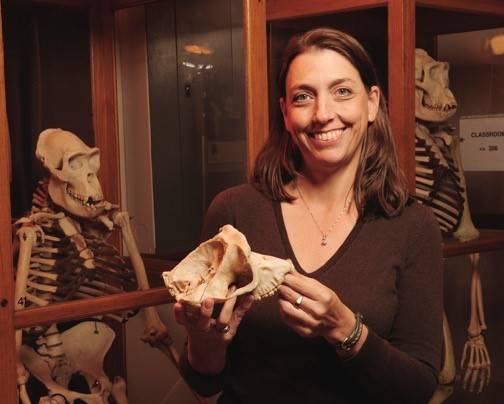Anthropologist studies primates as key to early human evolution
Julie Cooper | January 17, 2019

Texas State anthropology professor Dr. Jill Pruetz might take issue with the phrase “you can’t go home again.”
While her academic career has taken her far away from Central Texas, the professor is very happy to be back where she earned bachelor’s degrees in sociology and anthropology. In 2016, Pruetz was a featured alumna in Hillviews magazine as one of the “Stars of Texas State.” At that time, she was teaching at Iowa State University and conducting research on chimpanzees at the Fongoli Savanna Chimpanzee Project in Senegal.
In 2017, Pruetz joined the faculty at the College of Liberal Arts. She also serves as a lecturer for National Geographic Expeditions in Africa — participating about three times a year. This year, between semesters, she led a National Geographic tour group in Rwanda and Uganda.
Pruetz is no stranger to the National Geographic Society, in 2008 they placed her among the society’s “Emerging Explorers.” In 2012, she was named a Texas State Distinguished Alumni. Today she makes her home on five acres outside of San Marcos in a tiny house with a couple of cattle. That’s pretty much full circle for an animal lover originally from rural Yoakum.
In addition to her research, Pruetz is teaching two classes this spring semester: A graduate class in Biological Anthropology and Intro to Biological Anthropology for undergraduates. “One of the things I am excited about — Texas State gave me funds to buy a thermal imaging camera. We have embarked on a new area of study,” she says. Pruetz explained that because the chimps live on the savanna, she is studying how they deal with heat stress. “They use caves to cool off in.” The chimps’ habitat is restricted by water. “Any farther north would be sub-Saharan.” She also explains that they are “critically endangered,” which is one step below being declared extinct.

Pruetz says her studies have helped form hypotheses of early human evolution. “That’s why I started studying chimps in the first place, as an anthropologist this gives you insight.” In many ways, she says, chimps are better models of early human relatives than any human living today.
This month, BBC America will televise a wildlife documentary, “Dynasties” featuring Pruetz and the chimpanzees at Fongoli. The segment, to air Jan. 26, follows one chimp named David and his ”rise to power and how he maintains his power.” The series, which is narrated by Sir David Attenborough, follows different animals “as they struggle with their own dynasty.”
There are those who have compared Pruetz and her work to famed primatologist Jane Goodall. “I always feel a little embarrassed,” Pruetz says. “I worry about a world that doesn’t have a Jane Goodall. She has done so much.”
The professor says she began studying chimps in captivity in Bastrop, home to the National Center for Chimpanzee Care (NCCC). She is the director of Neighbor Ape, a 501c3 organization that seeks to conserve chimpanzees in Senegal, but also provides for the people who live there.
She has also studied primates in Kenya, Nicaragua, and Peru. As a post-doctorate candidate, Pruetz helped establish a field site to study primates in Costa Rica. This June, she will teach Texas State students during a study abroad trip there.
Pruetz says she is excited about the university’s new Ph.D. program in anthropology. “We are looking at how climate change will affect the chimps. The applied Ph.D. program fits this well, because you have so many threats to chimps in Senegal. “I’ve had to step up and focus on conservation. When I was a graduate student, I wanted to do something on conservation, but was told I could not.”
To learn more about Dr. Jill Pruetz's research with the Fongoli Savanna Chimpanzee Project, visit http://savannachimp.blogspot.com/.
Meet David: The Alpha Chimp Defending His Crown | Dynasties | BBC Earth
Share this article
For more information, contact University Communications:Jayme Blaschke, 512-245-2555 Sandy Pantlik, 512-245-2922 |